Up on Deck: Inside the World of Swim Officials
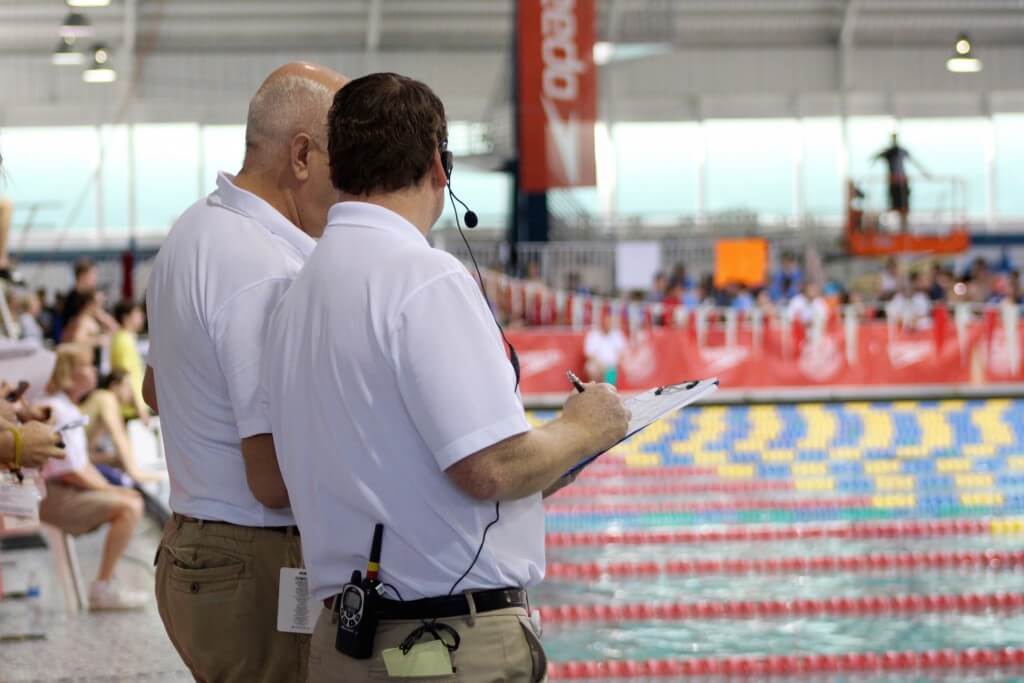
By Madeline Ladd, Swimming World College Intern.
Officials. They are the dedicated men and women present at the end of the lane during during every one of your meets. Whether it be a local pool’s summer league competition on a Wednesday night or the biggest stage in swimming – the Olympic Games – officials are always there giving their time and effort. It is often overlooked how much they do for the swimming community; without them, meets could not run and swimming would not be a successful sport.
Today, an overwhelming issue in the officiating community is the lack of officials at meets. Larry Schwarz, Middle Atlantic Swimming Officials Chair has been officiating for 22 years, beginning when his daughter was an 8-year-old swimmer in Middle Atlantic herself. Brigitta Braatz, another veteran official in Middle Atlantic Swimming, has been officiating for 15 years, beginning at her children’s local summer swim league. She has been USA certified for over a decade in addition to being certified as an official at the high school and collegiate level. Needless to say, both Schwarz and Braatz know the ropes of officiating and are first-hand witnesses of this shortage of officials. The two were asked to speak about their experiences as officials and highlight the shortage issue.
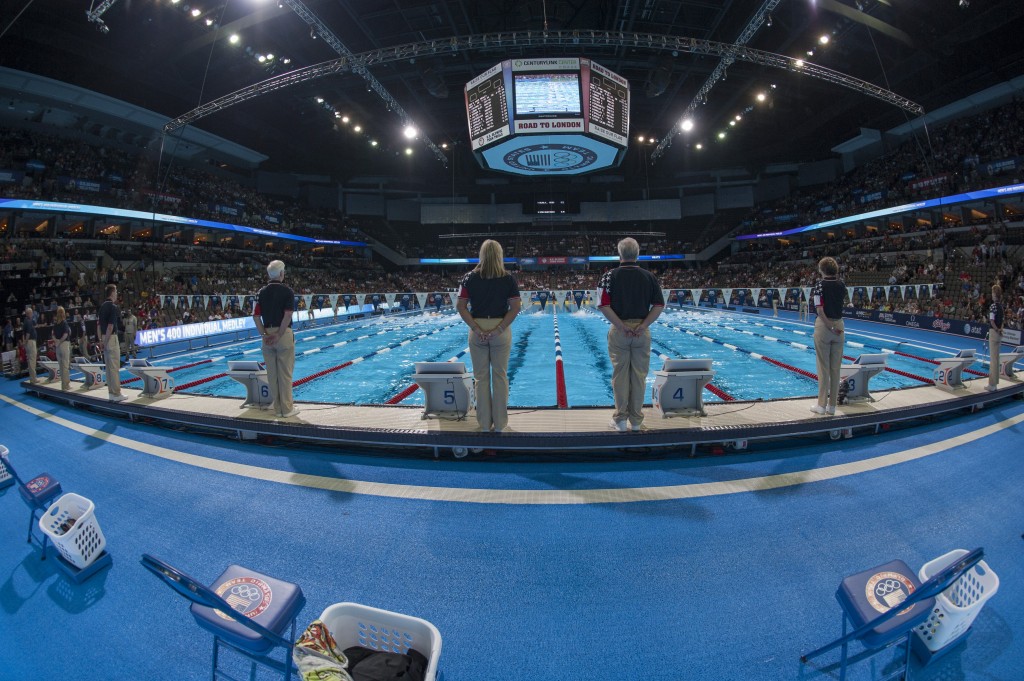
Photo Courtesy: acintosh)
Zoom out your perspective to the view on deck and see the inside scoop into the world of officials.
What inspired you to become an official?
Braatz: Both of my daughters swam, each excelling in breaststroke. That simply meant staying until the very end of each and every meet. Tired of the hard benches in crowded stands, I saw officiating as a way to get closer to the action. Many years later, my children have moved on and away from USA swimming. I have gained a better understanding of the technical aspects of swimming, an even better relationship with my daughters, and a new group of friends from around the country. One lesson and warning to others – that coveted ‘up front seat’ meant that I actually missed watching some of their swims!
Schwarz: When my daughter first started swimming, she could not swim the breaststroke. At all. She was continually DQ-ed (and appropriately so). I became curious and wanted to understand the rules of the stroke so I could help her improve (or at least understand what she was doing incorrectly). The easiest way to do that was to become an official. So I did just that.
What is your favorite part about being an official?
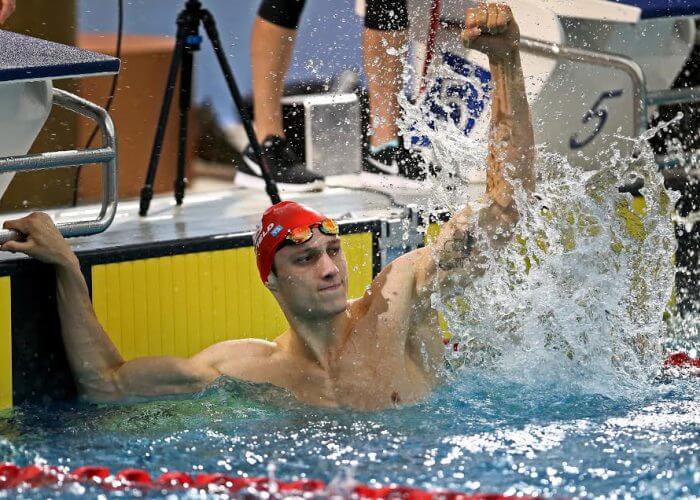
Photo Courtesy: BW Media
Braatz: The excitement of being on deck; from the youngest to the most competitive swimmer each providing a different type of energy and excitement. I find it striking that there is something about the look of accomplishment that is the same at any age. The 5-year-old who just won their heat for the first time (earning the coveted heat winner ribbon), the 12-year-old that just set a record, the 18-year-old earning a place on the podium at high school states, the professional now on their way to the Olympics – each gleaming with pride and a smile that reflects from the surface of the pool.
Schwarz: The social aspect of being an official is also a very pleasurable part of the experience. Officials are a close-knit group in the sense that we share some common knowledge and experiences that neither coaches, swimmers, nor parents understand fully. We bond over those commonalities and share them with one another on and off deck. It’s a special camaraderie, and I always look forward to seeing my old friends when I step onto the deck.
What is the most difficult part about being an official?
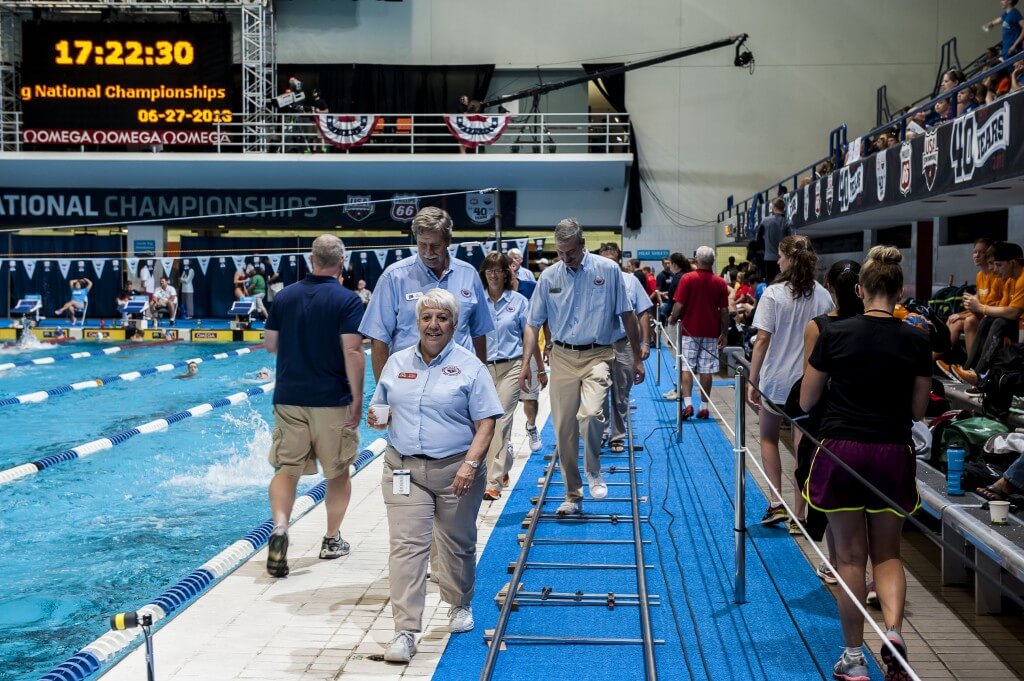
Photo Courtesy: Peter H. Bick
Schwarz: The most difficult part of being an official is dealing with others’ negative emotions, especially when directed at you. Swimmers are (appropriately) disappointed and upset when they are disqualified, especially if that DQ happens in an important race or meet. Coaches can become angry and belligerent in defense of their swimmers. Parents are often the most irate of all (which is ironic, since they typically understand the least about the technical rules that caused the DQ in the first place). And all those emotions are often channeled toward the official(s) who made the call. No one wants to upset people or to be seen as the “bad guy,” but this is too often the byproduct of enforcing the rules.
Do you have a specific meet or event that you have participated in as an official that has had great meaning/impact on you?
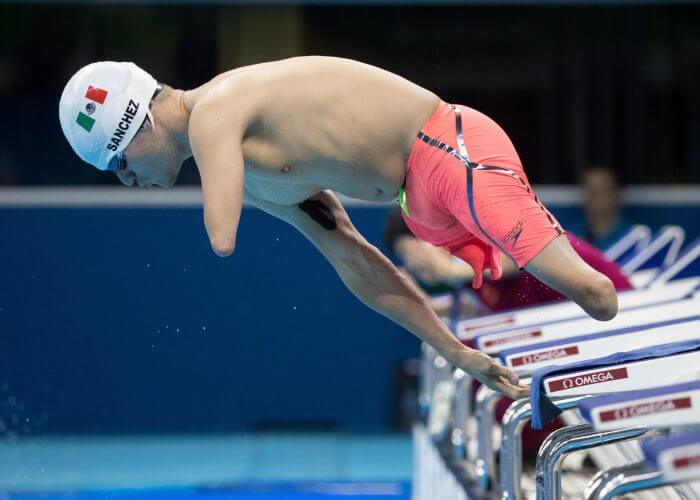
Photo Courtesy: USA TODAY Sports
Braatz: My initial thought was to share the opportunity to have worked a meet with several Olympians competing. While that certainly provided opportunity for viewing spectacular swims, it doesn’t come close to a local meet at the GCIT pool. It was an age group meet where I was in the role of Stroke & Turn at the start end. I watched as a swimmer removed his prosthetic leg and pulled himself onto the starting block. Watching him swim did cause my eyes to tear up. I was awed and inspired. He reminded us that we can achieve great success even if we don’t have all the “required”; it simply requires a passion – the kind this young man certainly possessed.
Schwarz: Watching a happy swimmer (after earning a significant time) run up to and hug their coach is a moment of pure joy that we can share vicariously. Offering a tearful kid who has missed their original heat a place in an upcoming heat so they can still swim their event is a small kindness, but those are the moments when, as an official, you can make life a little better for someone. Arranging aids for a disabled swimmer so they can compete on even terms with the able-bodied makes everyone feel good. For me, it’s the small victories that keep me going.
Do you feel that the shortage of officials at meets is becoming an issue in the world of swimming? How can people combat this?
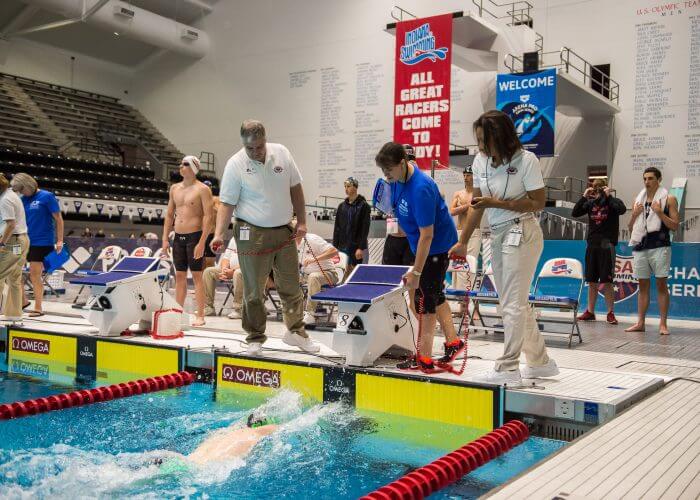
Photo Courtesy: Peter H. Bick
Braatz: Over the past few years, the times I have received last-minute panic requests seem to have increased exponentially. These meets calling for help were not just understaffed to effectively run a meet but also lacking the minimum required officials. (Four officials are needed for times to be allowed entry to SWIMS database and count for swimmers.) While I choose to volunteer and give back to a great sport, I can’t realistically give up every weekend to help on the pool deck. There is a mystique to officiating: a lack of understanding as to who/what/where/how to become an official. I have had many ask me what we are paid. I have sat in on new parent meetings where the role of the swim official is not discussed. Communication needs to be improved and clubs should be actively seeking out and encouraging parents to consider officiating. We need more people to get involved!
Schwarz: Obtaining and retaining officials is a constant battle. Too many parents seem to feel that their only obligation to the sport is to pay their children’s club dues and drive them to practice and meets. Just think about how many times meets start late because we can’t even find enough volunteer timers to man the lanes, and timing takes relatively little training or knowledge! In contrast, it takes considerable time, effort and some out-of-pocket expenses to become an official. Many are simply not willing to give themselves to this level. For those who make that effort, in most cases, the only reward is free lunch and wet socks.
Often, once swimmers move on to college, their parents stop officiating USAS/MA meets, so that we lose all that expertise that took years to develop. It’s not easy to find new officials. One problem is that, on the surface, officiating does not seem obviously rewarding. Looking at it from the outside, the hours are long, the “pay” is non-existent, and people often are unhappy with you (when you make a call). What outsiders don’t see is how rewarding it is to run an orderly meet where children have an opportunity to engage in a competitive yet social environment which allows them to grow and thrive. Officials set the stage for those successes and ensure that those triumphs are fairly earned. But these are psychic rewards that are not readily transparent to onlookers. And, at present, there is no ongoing local or national promotional campaign to present officiating as fun, valuable or rewarding. So we struggle…
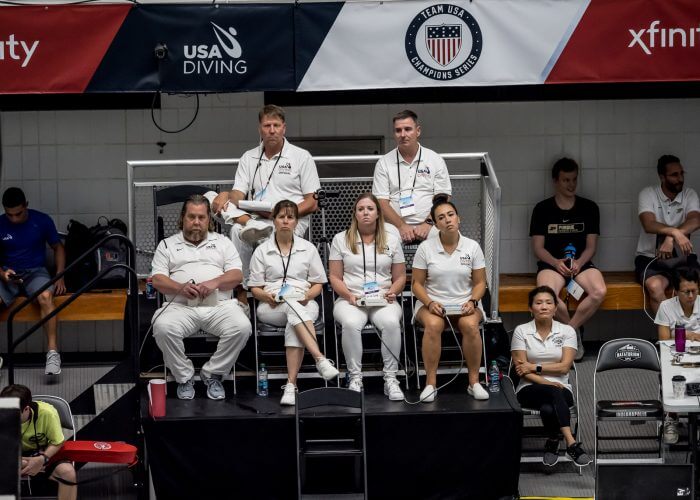
Photo Courtesy: Peter H. Bick
The shortage of officials in the swimming community is something that needs to gain a greater awareness and be brought to the eyes of more swimmers so that positive change can be made. When speaking about his experiences, Schwarz states something he wants each person to take away from his role as an official:
“The job of an official is to ensure that every swimmer is allowed to succeed or fail based on their own merits. We believe innate talent, level of dedication to one’s craft, and willingness/unwillingness to put in the hard work should determine who wins a race. Our goal as officials is not to decide who should win or lose – or to actively help or impede specific individuals – but to make certain that everyone competes by the same rules and standards so that all can test themselves fairly and have an equal opportunity to succeed.”
To the Swimmers
Have you ever taken the time to thank an official at one of your meets? Did you pay them any mind other than the times you’ve been DQ’d? Think about this and all they are doing for your swimming career behind the scenes. These men and women have a love for swimming and want to benefit the community with their actions.
To the Parents
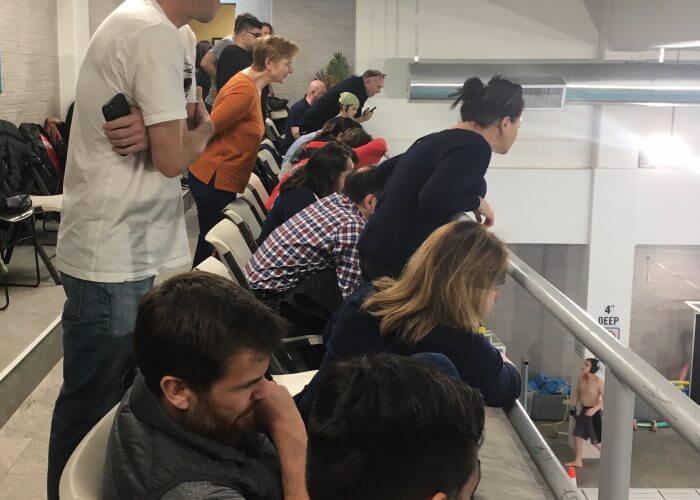
Photo Courtesy: M. Randazzo
Have you ever considered officiating? Maybe it’s a thought that never crossed your mind before reading this article. Well, just know the swimming community needs all the new officials they can get, and it’s a way to get involved at meets and create a lasting impact.
To coaches, Parents, and Swimmers Alike
Respect your officials and treat them positively. They are devoting their time with your best interest at heart to keep the sport of swimming alive. Even if they make a call that upsets you or you deem to be unjust, know that they are doing it to keep the sport fair: it is nothing personal. At meets, make sure you are doing your part to keep the meet running smoothly, and trust in your officials. They are there to help.
-All commentaries are the opinion of the author and do not necessarily reflect the views of Swimming World Magazine nor its staff.




Timer Penrod
Kim Cook
Chris Pappas
Some great points are made in the article. I’ve been USA swim certified for a decade now, summer swim certified for a dozen years, and three years of HS swim. I’m very much on the fence if I renew next year when the kid ages out. I’ve made some good friends and enjoy giving back, but just not sure I want to maintain the commitment (and it IS a commitment). Most of my favorite moments don’t even involve my kid and I’m most proud of the efforts our summer team makes to include kids on the spectrum. They comprise almost 10% of our roster and seeing them get life skills matters so much more than just about anything.
Thank you!! I was excited to be writing this article in hopes that it would shine more of a light on the officials that do so much for the swimming community! As a swimmer myself, Im sure I speak for swimmers nationwide when I say I can name numerous ways in which they’ve impacted me. I’m so glad to hear you enjoyed reading the article, and thank you for your time as an official.
Chris Pappas agree! i work with those kids every day? i send many to the Frogs
Warren Phillips fyi